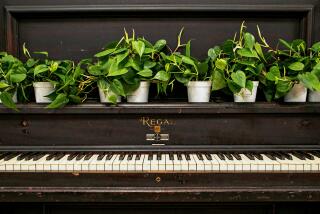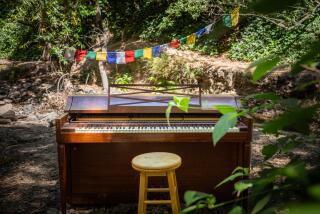A New Key in Cuban Relations
- Share via
HAVANA — Each weekday morning, a piano tuner from California mounts his bicycle and sets out for a music school three miles away to pursue an obsession--the seeding of Cuba with decent pianos.
Appalled by the condition of Cuba’s piano stock during a visit last year, Ben Treuhaft, 48, launched a nationwide “Send-a-Piano-to-Cuba” campaign in the United States. He managed to collect 22 plus an organ.
Nowadays, he tunes these relics, a task not nearly as stressful as the challenge of getting them to Cuba, even before the recent escalation of tensions with Washington.
Bored and restless at home in Berkeley, Treuhaft decided he wanted to ply his trade in a “weird place.”
That he chose Cuba is perhaps not surprising, given his upbringing in a decidedly left-wing household. His parents were both Communist Party members in the 1950s. His mother is the noted social critic Jessica Mitford, author of “The American Way of Death.”
On arrival, Treuhaft discovered that pianos had been left to the mercy of the salty air and wood-eating ants. In a country as poor as Cuba, especially since the collapse of the Soviet Union, new pianos or even spare parts are out of the question.
Treuhaft wanted to help, but was unsure whether the U.S. trade embargo against Cuba would be an obstacle.
After balking initially, the Commerce Department reconsidered his request and, somewhat curiously, decided to reroute it to the Office of Missile and Nuclear Technology.
To Treuhaft’s surprise, the U.S. government gave him the green light, breaking new ground in the process. No other American had been given permission to send goods to a Cuban state entity since the embargo took effect more than 30 years ago.
The battle with the Washington bureaucracy behind him, Treuhaft was faced with the challenge of delivery. Using cash donations, his own money and loans, Treuhaft assembled almost $15,000 and was able to arrange what he thought would be a land and sea journey of less than a month. But delivery in Havana did not occur for more than two months because of delays at the U.S.-Mexican border and at the Mexican port of Tampico.
For much of the time since, Treuhaft has spent his days with five Cuban co-workers, two of whom are blind, trying to get the old discards to sound like new. He goes about that task at the Superior Art Institute, an old playground for the Cuban elite where former U.S. President Richard M. Nixon once showed up in the days before Fidel Castro’s revolution.
Once the pianos are ready for serious playing, music institutions around Cuba will receive two each, one of which will be donated to a promising youngster.
Treuhaft had planned to resume his pianos-for-Cuba campaign later this year, hoping to round up 100 more. But he will probably have to shelve that idea because Washington has tightened the trade embargo in retaliation for Cuba’s downing of two civilian planes flown by American-based Cuban dissidents.
Informality is one of Treuhaft’s many trademarks. Cubans seem awed by his generosity and delighted by his constant banter as he replaces strings and reshapes hammers. To Santiago Rodriguez, who keeps tabs on the instrument supply at the institute, Treuhaft is heaven-sent.
“Cuba has benefited greatly from the solidarity Benjamin has shown toward our culture,” Rodriguez said. “The embargo has knocked on every door, including the cultural door.”
Treuhaft is contemptuous of the trade embargo. “I hate this policy,” he said. “I would do almost anything for a change. The government is not collapsing and everybody’s hungry.”
“I’m a Fidelista type,” he added.
More to Read
Sign up for Essential California
The most important California stories and recommendations in your inbox every morning.
You may occasionally receive promotional content from the Los Angeles Times.










